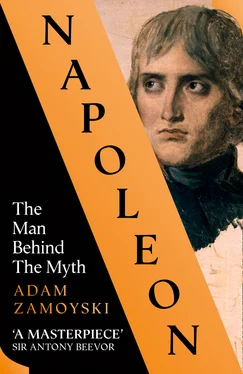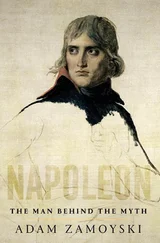On 16 October Buonaparte was promoted to divisional general, and ten days later he was confirmed as commander of the Army of the Interior. He had been effective military governor of Paris since 6 October, and had immediately set about pacifying the city, reforming the National Guard and confiscating privately-held arms, discharging officers with royalist leanings and closing down the Jacobin Club, and taking in hand the police of the capital. Not confining himself to his headquarters in the Place Vendôme, he rode about the city, escorted by a retinue of staff officers and a growing number of aides, including his brother Louis, for whom he had obtained the rank of lieutenant, Junot, Marmont and Murat, whose dash in the early hours of 5 October had impressed him. ‘He never went anywhere without his moustachioed officers with their long sabres,’ recalled Barras. ‘He would mount his tall palfrey, wearing a huge hat with its tricolour plumes and its turned-up rims, his boots turned down, and a dangling sabre larger than its wearer.’ Junot and Murat had been promoted by Buonaparte, and wore with panache the distinctions of a rank they did not officially hold, while Murat embellished his uniform with various outlandish accoutrements.8
Buonaparte himself had grown into his role. Gone was the awkward gait. ‘He already had extraordinary aplomb, a grand manner quite new to me,’ remembered Marmont. He would go to the theatre, making a dramatic entrance with his entourage of swaggering young bloods, their spurs and sabres clinking as they went. He was developing a taste for the theatrical, and was learning a new part. During a food riot in one of the poorer quartiers as he rode through it one day with his glittering cavalcade, he confronted a huge woman who accused his like of growing fat on their salaries by asking her which of them was the fatter, which provoked mirth and defused the situation.9
While he had not gained weight, he was certainly growing fat in the sense the woman meant. Barras, himself one of the great embezzlers of history, had seen to it that Buonaparte was well provided for. How, we do not know. Although he was drawing a salary of 4,000 francs a month, the value of the assignats in which it was paid had fallen dramatically: by 23 October it had dropped to 3 per cent of its nominal value, and specie was extremely scarce. With a pound of sugar costing 100 francs and a bushel of potatoes 200, his salary would not have gone far. He did get a daily allowance for food and other essentials, and fodder for his horses. But that does not explain how he was able to provide his mother with financial assistance adding up to more than his annual salary, send Joseph 400,000 francs, and badger Bourrienne to find him a property to buy.10
As well as money, he was not short of influence. He now wrote to Letizia that Paulette must not marry Fréron, who no longer counted politically. He was in the process of arranging a consulate in Italy for Joseph, and in the meantime obtained for him letters of marque licensing two corsairs to operate out of Genoa and prey on British shipping. He found Lucien a job as commissary to the Army of the North, and Fesch one as a secretary, pending a better job overseeing the Paris hospitals. Nor did he forget more distant relatives. ‘The family wants for nothing,’ he declared to Joseph with satisfaction in a letter of 18 December. ‘I have sent them all money, assignats , clothing, etc. …’11
Barras relates that he was arranging to set Buonaparte up by marrying him off to Mademoiselle de Montansier, an older lady who owned several theatres in Paris, a sure source of income at the time. Thoughts of Désirée would not stand in the way: in a letter to his sister-in-law Marie-Julie Clary, Buonaparte mentions every member of the family but her. In a letter of 9 December he bids Joseph to give her his regards, but for the first time refers to her as Désirée, not Eugénie. He does ask for news of her in one written ten days later, but without the impatience that accompanied previous requests. Buonaparte did not, however, marry Mademoiselle de Montansier.12
Shortly after he had ordered all privately-owned arms to be confiscated, a fourteen-year-old boy called at his headquarters, begging that he might be allowed to keep the sword which had belonged to his father, a general guillotined under the Terror. Moved by the boy’s request, Buonaparte agreed. The following day, the story goes, the grateful mother called. Or he may have called on her, bringing the document permitting the family to keep the sword. Or, as Buonaparte would have us believe, he sent along one of his aides, who reported back that she was a beautiful widow. Or the whole story may be a fable woven round some incident to do with the sword. It is unlikely that Buonaparte had never met the widow in question, since she was a close friend of the ladies whose salons he had been frequenting for months, and, being the mistress of Barras, was often at his side. One thing is certain – that General Buonaparte fell madly, almost obsessively in love with her.13
Marie-Josèphe-Rose de Beauharnais was born into the parvenu and scandal-ridden family of Tascher, who owned La Pagerie, a plantation in the French island colony of Martinique. She was brought to France and married off at an early age to an undistinguished nobleman, Alexandre de Beauharnais, who paraded under the assumed title of vicomte. He was jealous and abusive as well as unfaithful, and repudiated her after having sired two children. During the Revolution he had briefly presided over the National Assembly and then been put in command of the Army of the Rhine. An inept soldier, he had allowed the fortress of Mainz to fall to the enemy in 1793 out of fecklessness, but was accused of treason and executed the following year. His wife, known in childhood as Yéyette and later as Josephine, was incarcerated in the same prison, Les Carmes, where, while he was conducting an affair with the widow of an executed general, she was doing the same with General Lazare Hoche, also a prisoner.
Prisons were hotbeds of sexual activity during the Terror, and Les Carmes, whose walls were still smeared with the blood of the 115 priests massacred there in September 1792, was no exception. The usual instinct in the presence of impending death was in this case reinforced by the hope of getting pregnant, which would spare a woman the guillotine. As a result, the multiple-occupancy chambers throbbed to the sound of couplings, often with the warders themselves, in scenes of fear and degradation which left their mark on those like Josephine who were fortunate enough to survive.
On her release from prison following the fall of Robespierre, Josephine made the most of the friendships forged there with, amongst others, Thérèse Tallien. She resumed her affair with General Hoche and was prominent in the exuberant new society, the salons and the extravagant macabre entertainments of the capital. Sometime in the early summer of 1795 she became the mistress of Barras, but by the beginning of the autumn he was ready to move on and began looking around for a husband who might provide for her. She had no money and was living from day to day on the generosity of lovers, currently that of Barras, who had rented a small house for her off the rue Chantereine.
Josephine was thirty-two and, as Barras put it, ‘growing precociously decrepit’. She had never been a beauty, and with her freshness wilting she had to resort to what he called ‘the most refined, the most perfected artistry ever practised by the courtesans of ancient Greece or Paris in the exercise of their profession’. She knew how to overcome every disadvantage, concealing her rotten teeth by keeping her mouth shut when she smiled, which many found irresistible. She possessed an almost legendary charm, grace, and a languor of movement which people associated with her creole origins, lending her a certain spice in their imagination. She was both dignified, with elegant manners and bearing, and girlishly light-hearted, displaying a devil-may-care attitude to practicalities. And there is little doubt that she was an accomplished lover. But she had no position to fall back on when these assets failed, and marriage was the only practical way of securing her future.14
Читать дальше












